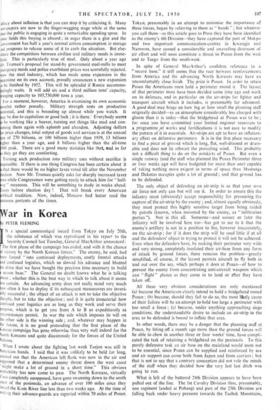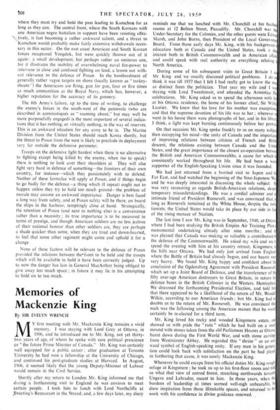ar in Korea
y PETER FLEMING N a special communiqué issued from Tokyo on July 20th, the substance of which was reproduced in his report to the Security Council last Tuesday, General MacArthur announced: The first phase of the campaign has ended, and with it the chance f victory by the North Korean forces." The enemy, he said, had een forced " into continued deployments, costly frontal attacks nd confused logistics, which so slowed his advance and blunted is drive that we have bought the precious time necessary to build secure base." The General no doubt knows what he is talking bout , whether this is the best way in which to talk about it seems ss certain. An advancing army does not really mind very much ow often it has to deploy if its subsequent manoeuvres are invari- bly successful ; the object of an attack is not to take the objective heaply, but to take the objective ; and it is quite immaterial how onfused your logistics are as long as they work and serve their urpose, which is to get you from A to B as expeditiously as ircumstances permit. In war the side which imposes its will on he other side is the winning side ; and, whatever may happen in e future, it is no good pretending that the first phase of the orean campaign has gone otherwise than very well indeed for the orth Koreans and quite disastrously for the forces of the United ations.
When I wrote about the fighting last week Taejon was still in American hands. I said that it was unlikely to be held for long, pointed out that the American left flank was now in the air and tuggested that a determined enemy thrust down the west coast might make a lot of ground in a short time." This obvious probability has now come to pass. The North Koreans, virtually If not completely unopposed, have gone swanning down to the south Coast of the peninsula, an advance of over 100 miles since they forced the Kum River line less than two weeks ago. At the time of writing their advance-guards are reported within 70 miles of Pusan.
Tokytiv, presumably in an attempt to minimise the importance of these forces, began by referring to them as " bands " ; but whatever you call them—as this article goes to Press they have been identified as the enemy's 4th Division—they have captured the port of Mokpo and two important communication-centres in Kwangju and Namwon, have caused a considerable and unavailing diversion of air effort and will soon constitute a threat to Pusan from the west and to Taegu from the south-west.
In spite of General MacArthur's confident reference to a " secure base," it still seems that the race between reinforcements from America and the advancing North Koreans may have an uncomfortably close finish. The prize is Pusan. In order to retain Pusan the Americans must hold a perimeter round it. The layout of that perimeter must have been decided some time ago and work on its defences, and in particular on the air-strips for fighter and transport aircraft which it includes, is presumably far advanced. A good deal may hinge on how big or how small the planning staff originally decided—in an atmosphere considerably less charged with- gloom than it is today—that the bridgehead at Pusan was to be ; for once you have committed your limited engineer resources to a programme of works and fortifications it is not easy to modify the pattern of it in essentials. Air-strips are apt to have an inflation- ary effect on defensive perimeters It is in the first place necessary to find a piece of ground which is long, flat, well-drained or drain- able and does not lie athwart the prevailing wind. This probably not a difficult thing to do on the outskirts of Pusan. But even a single runway (and the staff who planned the Pusan Perimeter three or four weeks ago will have budgeted for more than one) capable of taking nothing more exigent in terms of space than Mustangs and Dakotas occupies quite a lot of ground ; and that ground has to be defended.
The only object of defending an air-strip is so that your own air force not only can but will use it. In order to ensure this the infantry must (obviously) accept responsibility for preventing the capture of the air-strip by the enemy ; and, almost equally obviously, they must protect this highly sensitive target from being raided by patrols (known, when mounted by the enemy, as " infiltration parties "). Nor is this all. Someone—and sooner or later the infantry will be involved here too—has got to see to it that the enemy's artillery is not in a position to fire, however inaccurately, on the air-strip ; for if it does the strip will be used little if at all and the defenders' object in trying to protect it will not be achieved. Even when the defenders have, by making their perimeter very wide and very strong, completely insulated their air-base from any form of attack by ground forces, there remains the problem—greatly simplified, of course, if the layout permits aircraft to fly both in and out over the sea, which perhaps it does at Pusan—of how to prevent the enemy from concentrating anti-aircraft weapons which can " flight " planes as they come in to land or after they have taken off.
All these very obvious considerations are only mentioned (a) because the Americans clearly intend to hold a bridgehead round Pusan ; (b) because, should they fail to do so, the most likely cause of their failure will be an attempt to hold too large a perimeter with too small a force ; (c) because, under anything approaching siege conditions, the understandable desire to include an air-strip in the area to be defended is bound to inflate that area.
In other words, there may be a danger that the planning staff at Pusan, by biting off a month ago more than the ground forces will be able to chew in another three or four weeks' time, have compli- cated the task of retaining a bridgehead on the peninsula To this purely defensive task an air base on the mainland would seem not to be essential, since Pusan can be supplied and reinforced by sea and air support can come both from Japan and from carriers ; but that is not to say that a contrary conception did not rule the minds of the staff when they decided how the very last last ditch was going to run.
What is left of the battered 24th Division appears to have been pulled out of the line. The 1st Cavalry Division (less, presumably, one regiment landed at Pohang) and part of the 25th Division are falling back under heavy pressure towards the Taebek Mountains, where they must try and hold the pass leading to Kumchos for as long as they can. The central front, where the South Koreans with one American negro battalion in support have been resisting effec- tively, is fast becoming a rather awkward salient, and a threat to Kumchon would probably make fairly extensive withdrawals neces- sary in this sector. On the east coast American and South Korean forces recaptured Yongdok, but were quickly thrown out of it again : a small development, but perhaps rather an ominous one, for it illustrates the inability of overwhelming naval fire-power to intervene in close and confused fighting on land, a lesson not with- out relevance to the defence of Pusan. In the bombardment of generally rather vague targets on shore (locally known as " turkey- shoots ") the Americans are firing, gun for gun, four or five times as much ammunition as the Royal Navy, which has, however, a higher reputation for the accuracy of its gunnery.
The 8th Army's failure, up to the time of writing, to challenge the enemy's forces in the south-west of the peninsula (who are described in communiqués as " roaming about," but may well be more purposefully engaged) is the most important of several indica- tions that it has nothing, or virtually nothing, in the way of reserves. This is an awkward situation for any army to be in. The Marine Division from the United States should reach Korea shortly, but the threat to Pusan from the west is likely to preclude its deployment very far outside the defensive perimeter.
Troops on the defensive fight hardest when there is no alternative to fighting except being killed by the enemy, when (so to speak) there is nothing to look over their shoulders at. They will also fight very hard in defence of something—the frontiers of their own country, for instance—which they passionately wish to defend. Neither of these formulae will apply at Pusan, and if things begin to go badly for the defence—a thing which (1 repeat) ought not to happen unless they try to hold too much ground—the problem of morale may assume an awkward importance. Danger is best faced a long way from safety, and at Pusan safety will be there, on board the ships in the harbour, temptingly close at hand. Strategically, the retention of Pusan (and next to nothing else) is a convenience rather than a necessity ; its true importance is to be measured in terms of prestige, and though American soldiers are no less jealous of their national honour than other soldiers are, they are perhaps a shade quicker than some, when they are tired and down-hearted, to feel that some other regiment might come and uphold it for a change.
None of these factors will be relevant to the defence of Pusan provided the relations between the'-front to be held and the troops which will be available to hold it have been correctly judged. Up to now the danger has lain in General MacArthur being obliged to give away too much space ; in future it may lie in his attempting to hold on to too much.



































 Previous page
Previous page